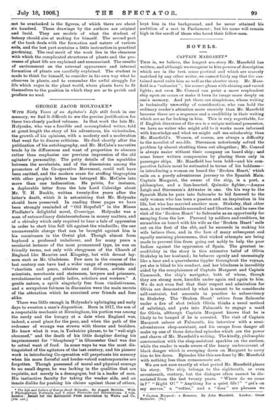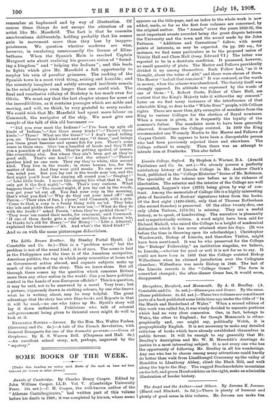NOVELS.
CAPTAIN MARGARET.*
THIS is, we believe, the longest sea-story Mr. Masefield has written, and although we recognise in him powers of description which are in the best sense poetical and which are scarcely matched by any other writer, we cannot fairly say that the sus- tained novel suits him so well as the shorter story. Mr. Muse. field is a "colourist "; his scenes gleam with shiuing and varied lights; not even Mr. Conrad can paint a more resplendent ship upon an ocean or make it burn its image more deeply on one's memory. And yet there are simpletons, whose writing is technically unworthy of consideration, who can hold the ordinary reader's attention more securely than Mr. Masefield because there are a sequence and a credibility in their writing which are so far lacking in him. This is very regrettable, for if English literature of the sea is a unique national possession, we have no writer who might add to it works more informed with knowledge and what we might call sea-scholarship than Mr. Masefield's. Women, of course, are always a difficulty to the novelist of sea-life. Stevenson notoriously solved the problem by almost shutting them out altogether; Mr. Conrad is always easier without their company on board ship ; and some lesser writers compromise by placing them only in passenger ships. Mr. Masefield has been bold—and his com- parative failure must be estimated in terms of his boldness— in introducing a woman on board the 'Broken Heart,' which sails on a purely adventurous journey to the Spanish Main. Captain Margaret, the owner of the ship, is a poet, a philosopher, and a lion-hearted, Quixotic fighter,—Amyas Leigh and Stevenson's Attwater in one. On his way to the Spanish Main he puts into Salcombe to bid farewell to the only woman who has been a passion and an inspiration in his life, but who has married another man. Stukeley, that other man, is an irredeemable scoundrel and libertine, and be uses the visit of the • Broken Heart' to Salcombe as an opportunity for escaping from the law. Pursued by soldiers and creditors, he scrambles on board with his wife as the 'Broken Heart' sails out on the first of the ebb, and he succeeds in making his wife believe then, and in the face of many subsequent and equally accusing phenomena, that wicked attempts are being made to prevent him from going out nobly to help the poor Indian against the oppression of Spain. The greatest in- credibility in the story is this extensive belief of Olivia Stukeley in her husband ; he behaves openly and unceasingly like a bear and a quarrelsome tippler throughout the voyage, yet she is blind to his conduct, and her blindness is incredibly aided by the complaisance of Captain Margaret and Captain Cammock, the ship's navigator, both of whom, though they are strong men, knuckle under again and again to him. We do not even feel that their respect and admiration for Olivia are demonstrated by what is meant to be considerate self-restraint, but amounts in practice to subserviency to Stukeley. The 'Broken Heart' retires from Salcombe under a fire of shot (which Olivia thinks a usual method of saluting), and puts into Falmouth to engage a maid for Olivia, although Captain Margaret knows that he is likely to be hanged if he is arrested. The visit of Captain Margaret ashore at Falmouth, his interview with a semi- adventurous shop-assistant, and his escape from danger all make up one of those detached episodes which are the power and charm of Mr. Masefield's writing. The kindly, philosophic conversation with the shop-assistant sparkles on the surface, while the reader is made aware of the heavy undercurrent of black danger which is sweeping down on Margaret to carry him to his doom. Episodes like this are done by Mr. Masefield with nothing less than consummate art.
We are not sure exactly at what period Mr. Masefield places his story. The ship belongs to the eighteenth, or even seventeenth, century, but the dialogue often cannot be dis- sociated from the last twenty years. "Where do we come in?" "Right 0 ! " "Anything for a quiet life !" " get's on my nerves," a "rotter," and a " doss " are phrases we
* Captain Margaret: a Romance. By John Masefield. London: Gran* Richards. [8s.]
remember at haphazard and by way of illustration. Of course these things do not escape the attention of an artist like Mr. Masefield. The fact is that he commits anachronisms deliberately, holding probably that his scenes gain in movement more than they lose by inappro- priateness. We question whether moderns are wise, however, in emulating unnecessarily the license of Eliza- bethans. When the Spanish Main is reached Captain Margaret sets about realising his generous vision of "found- ing a kingdom" and "helping the Indians"; and this leads to fights which give Mr. Masefield a full opportunity to employ his vein of peculiar grimness. The sacking of the Spanish town is a most vivid thing, seizing and horrible; and the minutely imagined and subtly arranged incidents remain in the mind perhaps even longer than one could wish. The final and conclusive villainy of Stukeley is too much even for Olivia. We must say that the last chapter atones for some of the ineredibilities, as it contains passages which are noble and moving, and will, we think, be very grateful to every reader. We could wish that Mr. Masefield had spent more labour on Cammock, the navigator of the ship. We must give one sample of the talk of this old buccaneer :— '"Did you ever meet the Indians ? I've been up agin all kinds of Indians.'—' Are there many kinds ? There's three
kinds.'—` Three? What are the three?'—' I don't mind telling you, sir. There's one kind comes and says, "0 Sieur," and brings you these great bananas and spears fish for you. There's some sense in them ones. Give 'em a handful of beads and they'll fill you a pannikin of gold dust. They're getting spoiled, of course, like everything else. But whore they ain't been got at they're good still. That's one kind.'—' And the others ? There's another kind no one seen. They say they're white, this second kind. They live in the woods ; in stone houses, too, for the matter of that. And they wear gold masks. No one ever seen 'em, mind you. But you lay out in the woods near 'em, and the first night you'll hear like singing all round you.'—' Singing ? ' —` Like little birds. I never like singing like what that i8. You only get it the first night.'—' Oh. That's very curious. What happens then? '—`The second night, if you lay out in the woods, you get your 'ed out off. You find your corp in the morning, that's what you find.'—' Why do they cut your head off ? ' said Perrin.—' Their idea of fun, I s'pose,' said Cammock, with a grin. 'Come to that, a corp is a funny thing with no 'ed. They take the 'eds and pickle them after : I've seen 'em.'—' What do they do with the heads ? ' asked Perrin, 'when they've pickled them ? '— ' They wear 'em round their necks, for ornament,' said Cammock. If one of them ducks gets a reglar necklace, like a dozen 'eds,
he thinks he's old Sir Henry.'—' Sir Henry ? Like a Admiral,' explained the buccaneer.—' Ah. And what's the third kind ?"' And so on With the same picturesque didacticism.







































 Previous page
Previous page